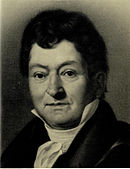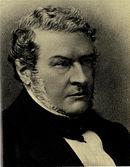IHK Offenbach am Main
The Offenbach am Main Chamber of Commerce and Industry is the Chamber of Commerce and Industry for the Offenbach am Main and Offenbach districts . The IHK, founded in 1821, is based in Offenbach am Main and is a corporation under public law . It has around 40,000 member companies.
The chamber is one of the 80 chambers of industry and commerce in Germany that are represented by the umbrella association of the German Chamber of Commerce and Industry based in Berlin. It has around 400 elected company representatives in IHK committees, 900 honorary auditors and 65 full-time employees.
In addition to the statutory provisions of the federal government ( IHK law ) and the state (in particular the Hessian implementation law for the IHK law), the statute law forms the basis of the work of the IHK Offenbach am Main. The IHK law regulates that the statutes, the election regulations, the contribution regulations and the fee regulations are subject to the exclusive resolution by the IHK plenary assembly. The IHK law also regulates that these resolutions of the plenary assembly require the approval of the state that oversees the chambers of industry and commerce. As a legally appointed representative, the Offenbach am Main Chamber of Industry and Commerce represents the overall economic interests of all industrial, trading and service companies in the city and district of Offenbach. She is responsible for promoting the commercial economy of her district.
history
When the Grand Duchy of Hesse was founded, the Mainz Chamber of Commerce , which was still founded during the French occupation, was retained. In 1821 the Chamber of Commerce in Offenbach was founded based on the model of the Chamber of Commerce in Mainz. The establishment of the chamber was ordered by ordinance of the Hessian Ministry of the Interior of June 21, 1821. It met for the first time on October 19, 1821, making it the seventh oldest chamber in Germany and the second oldest in Hesse. The aim was to promote the economy. Members were all merchants with at least 100 guilders business capital. These elected a 9-member board (a third of the members were newly elected every year). This board of directors chose its own chairman.
The first nine members were:
- Councilor Schwaner , oilcloth manufacturer
- Philipp Casimir Krafft, tobacco product manufacturer
- Peter Georg d'Orville , belonged to the tobacco factory Gebr. Bernard founded in 1733
- Johann Martin Goelzenleuchter, businessman
- Wilhelm Kugler, co-owner of the Crecelius Portefeuille-Fabrik
- II Böhm, partner in the freight forwarding company Böhm and Marchand
- H. Kirschten, businessman
- CL Brede, owner of a book printer
- J. Möller, leather goods manufacturer, partner in Möller & Dejonge
The legal relationships of the chambers of commerce in the Grand Duchy were approved by the law relating to the chambers of commerce , which was approved in 1871 by the state estates of the Grand Duchy of Hesse and on November 17, 1871 by Grand Duke Ludwig III. signed, reorganized. Now the Offenbach Chamber was a legal person. Entrepreneurs classified in the 4 highest business tax classes were now entitled to vote. The choice was made separately in the groups of industry, wholesale and retail. The contributions were determined depending on the trade tax payment.
With the Chamber of Commerce Act of 1902, the Grand Duchy largely adapted to the legal situation in Prussia . The chamber area (the Offenbach and Dieburg districts) covered an area of 88,092 hectares on December 31, 1905 with a population of 200,640 people. 1189 companies were registered there in the commercial register, of which 980 were entitled to vote for chambers. In 1925 the name was changed from the Chamber of Commerce to the Chamber of Commerce and Industry.
With the seizure of power by the Nazis in 1933, the self-management of the economy has been abolished. By decree of May 10, 1933, the members of the Chamber and the Presidium were appointed. Erich Gellrich was the new president; Willi Heyne, who had headed the chamber for the past 13 years, was appointed deputy. On April 20, 1942, the Chamber of Industry and Commerce was dissolved and only existed as a manager before it was absorbed into the Rhein-Main Gauwirtschaftskammer on January 1, 1943 .
After the Second World War , the Offenbach Chamber of Industry and Commerce became independent again. The first management meeting took place on April 3, 1945. The military authorities initially appointed Hans G. Heyne as President of the Chamber. Helmut von Wild was later appointed as his successor.
On January 10, 1946, the state government formally decreed the abolition of the Gau economic chambers in Hesse and the restoration of the law of 1933. The minister of economics and transport was to oversee the chambers . These regulations met with the contradiction of the American occupying power: They saw the public law position of the chambers as an important instrument for steering the economy during the National Socialist era . In implementing the American demands, the state government therefore decreed the performance of public law tasks in May 1946 and ordered the chambers to continue as private law associations without compulsory membership. The final regulations for the Chamber, its competencies and its election were laid down in a circular of December 5, 1846. The consequence of the discontinuation of compulsory membership was the withdrawal of a larger number of small businesses. The larger chambers lost up to 50% of the members, the smaller between seven and fifteen percent. As part of the denazification , the syndic of the chamber Dr. Giar and Assessor Dr. Retire Pfeifer. On May 9, 1947, chamber elections were held for the first time in 14 years. On June 9, 1947, a new presidium was elected.
With the occupation statute in 1949, the Federal Republic regained a good part of its sovereignty. Apart from Bavaria and Hesse, the states of the American occupation zone now returned to the model of public chambers (in the British and French zones this was the case immediately after the war). The SPD -governed Hessen had completely different plans: According to the government's will, the IHKs were to be dissolved and replaced by chambers of commerce. These should be filled equally by employers and employees. The employer representatives should be nominated by the trade associations and the employee representatives by the trade unions. However, these plans were not implemented because a nationwide regulation was made instead.
With the entry into force of the " Act on the Provisional Regulation of the Law of Chambers of Commerce and Industry " on December 22, 1956, the chambers are once again incorporated into public law corporations. The advisory board of a chamber is now called the "plenary assembly".
General Assembly
The IHK plenary assembly is the supreme body of the Offenbach am Main Chamber of Commerce and Industry. 57 voluntary members of the general assembly are directly elected by the companies belonging to the Chamber of Industry and Commerce for five years, with each company having one vote regardless of size. The formation of 13 branch-specific electoral groups ensures that the general assembly reflects the economic structure of the IHK district and its economic characteristics. The plenary assembly determines the guidelines of the IHK work and resolves on all questions that are of fundamental importance for the member companies from the city and district of Offenbach or the work of the IHK (§ 2 Statutes of the IHK Offenbach am Main.) Economic plan and sets the IHK contributions in the economic statutes.
The General Assembly elects the President and Vice-Presidents from among its members.
Personalities
President
| image | Surname | Term of office |
|---|---|---|
 |
Philipp Casimir Krafft | 1821-1836 |
 |
Jean-Peter d'Orville lifting dispute | 1836-1842 |
 |
Wilhelm Kugler | 1842-1850 |
 |
Eduard Goelzenleuchter | 1850-1863 |
 |
Julius monk | 1864-1874 |
 |
Carl Theodor Wecker | 1874-1889 |
 |
Franz Weintraut | 1890-1908 |
| Fritz Straw | 1909-1910 | |
| Otto Mohr | 1911-1912 | |
| Louis Feistmann | 1913-1917 | |
| Gustav Boehm | 1918-1919 | |
| Andreas Aicheler | 1920 | |
| Willi Heyne | 1920-1933 | |
| Erich Gellrich | 1933-1937 | |
 |
Hermann Hartmann | 1938-1945 |
| Hans G. Heyne | 1945 | |
| Helmut von Wild | 1945-1946 | |
| Friedrich Hengst ( Friedrich Hengst & Co ) | 1947-1962 | |
| Peter Pfender | 1962-1968 | |
| Karl Giebel | 1968-1976 | |
| Alois Bromkamp | 1976-1986 | |
| Rudolf Thiels | 1986-1994 | |
| Wolfgang Kappus | 1994-2000 | |
| Ingo Mayer | 2000-2007 | |
| Alfred Clouth | 2007-2017 | |
| Kirsten Schoder-Steinmüller | since 2017 |
Secretaries, Syndici and managing directors of the Chamber of Commerce and Industry Offenbach a. M.
- 1821–1824 Peter Georg d'Orville (Secretary)
- 1824–1834 Wilhelm Kugler (secretary)
- 1834–1838 Jean-Peter d'Orville-Hebenstreit (secretary)
- 1838–1854 Ludwig Spengler (secretary)
- 1854–1864 Franz Mutzbauer (secretary)
- 1864–1877 court lawyer Andres (secretary)
- 1877–1879 Alexander Weimann (secretary)
- 1879–1882 Paul Steller (secretary)
- 1882–1910 Josef Schloßmacher (Syndic)
- 1910–1932 Dr. Josef Cratz (Syndic)
- 1932–1944 Dr. Carl Leonhardt (Syndic)
- 1944–1945 Dr. Adolf Giar (General Manager)
- 1945–1963 Dr. Gustav Filtzer (General Manager)
- 1964–1977 Dr. Kurt Glück (Chief Executive Officer)
- 1978–1986 Dr. Volker Merx (General Manager)
- 1986–2000 Dr. Erik von Knorre (Chief Executive Officer)
- 2000–2012 Eva Dude (General Manager)
- since 2012 Markus Weinbrenner (General Manager)
Managing directors
- General manager: Markus Weinbrenner
- Managing Director Law and Taxes: Justiziar Martin Gegenwart
- Managing director location policy as well as business start-ups and corporate promotion: Frank Achenbach
- Managing Director International as well as Innovation and Environment: Frank Achenbach
- Managing director for training and further education: Friedrich Rixecker
literature
- Kurt Glück and Hermann Görlich: 150 years of the Offenbach am Main Chamber of Commerce and Industry 1821–1971, 1970
Web links
Individual evidence
- ^ Statistical handbook for the Grand Duchy of Hesse 1909, p. 100, digitized .
- ^ Martin Will: Self-administration of the economy: Law and history of self-administration in the chambers of industry and commerce, craft guilds, district handicrafts, chambers of crafts and agriculture, 2011, ISBN 3-16-150705-3 , pages 307-315, online
- ↑ HWA Abt. 9, No. 56; Greater Hesse State Ministry to the Chambers of Industry, Commerce and Crafts of the State of Greater Hesse, January 10, 1946
- ↑ HWA Abt. 9, No. 56; Circular decree of the Greater Hesse State Ministry to the Chambers of Commerce and Industry of the State of Hesse, May 9, 1946
- ↑ HWA Abt. 9, Nr. 37; Circular decree of the Greater Hesse State Ministry on the reorganization of the Hesse Chamber of Commerce and Industry, December 5, 1946
- ↑ HWA Abt. 9, No. 58; Draft law on the formation of chambers of commerce (Chamber of Commerce Act) of July 18, 1951
- ↑ Ulrich Eisenbach: Between commercial interest representation and public law mandate; in: Helmut Berding (Ed.): 125 years of the Giessen Chamber of Commerce and Industry: Economy in one region. Hessian economic archive. Darmstadt 1997, ISBN 3-9804506-1-9 , pp. 5-43.
- ↑ After 196 years, first woman at the head of Offenbach's Chamber of Industry and Commerce. In: op-online.de . September 16, 2017. Retrieved September 16, 2017 .


